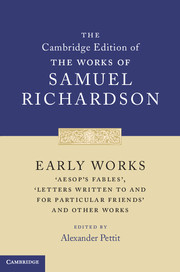Book contents
- Frontmatter
- Dedication
- Contents
- General Editors’ Preface
- Acknowledgements
- Chronology
- List of Abbreviations
- General Introduction
- Textual Introduction
- The Apprentice’s Vade Mecum (1733)
- A Seasonable Examination of the Pleas and Pretensions (1735)
- Preface to Aubin, A Collection of Entertaining Histories and Novels (1739)
- Aesop’s Fables (1739)
- Letters Written to and for Particular Friends (1741)
- Six Original Letters Upon Duelling (1765)
- Appendix: The Infidel Convicted (1731)
- Postscript
- Emendations
- Word-division
- Bibliographical Descriptions of Early Editions
- Explanatory Notes
- Index
Letter CLVII
Published online by Cambridge University Press: 30 June 2022
- Frontmatter
- Dedication
- Contents
- General Editors’ Preface
- Acknowledgements
- Chronology
- List of Abbreviations
- General Introduction
- Textual Introduction
- The Apprentice’s Vade Mecum (1733)
- A Seasonable Examination of the Pleas and Pretensions (1735)
- Preface to Aubin, A Collection of Entertaining Histories and Novels (1739)
- Aesop’s Fables (1739)
- Letters Written to and for Particular Friends (1741)
- Six Original Letters Upon Duelling (1765)
- Appendix: The Infidel Convicted (1731)
- Postscript
- Emendations
- Word-division
- Bibliographical Descriptions of Early Editions
- Explanatory Notes
- Index
Summary
From the same.
On a Concert or Musical Entertainment.
Honoured Madam,
I went last Night to see, or rather to hear, a new Entertainment of Musick: And must confess, I was much disappointed of the Pleasure I promised myself. I can't say but I liked two or three of the Songs well enough; and the Musick, that was playing all the while, I did not disapprove. But pray, Madam, can you tell me, (for I have already asked twenty, not one of whom will answer me)What is the Reason of having every Word spoken, squeaked to——I cannot say a Tune, but to such a Hum as makes me quite sick? If it be the Musick that is valuable, why must the Words torture it? And if the Words be sought after, wherefore should they be broken to Pieces by Notes that drown the Sound, and quite lose their Sense? What I mean is, I believe, called, Speaking in Recitative; but whence was this Mode of Speech taken? In what Country is it natural? And if it be natural no-where, of what is it an Imitation? What are the Marks of its Excellencies? and how shall we judge of its Merit? Whence can arise any Pleasure from hearing it? And shall we find Cause for excusing the Time lost in such an unnatural Amusement? For myself, I must own ‘twas far from delighting me; for as it was neither singing nor speaking, I could not tell what to make of it; for it was more like to make me cry than laugh, I was so provoked, when the Twang of the Harpsichord robbed me of the Word the whole preceding Line depended upon!—I must confess myself for downright Speaking or Singing: I hate Mongrels. Unless my Judgment be convinced by such Reasons as I can’t, for my Life, hit upon at present. Yet, after all, I begin to think, I am betraying my Ignorance all this time; and so I’ll conclude myself, Madam,
Your most dutiful Niece.
- Type
- Chapter
- Information
- Early Works'Aesop's Fables', 'Letters Written to and for Particular Friends' and Other Works, pp. 499 - 500Publisher: Cambridge University PressPrint publication year: 2011

